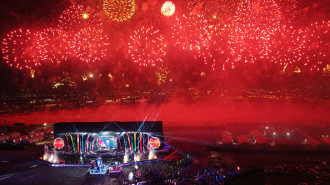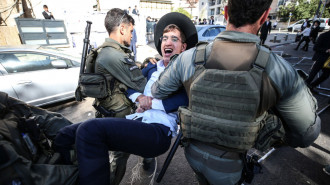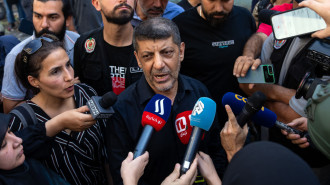Campaigning for Iraq's provincial elections kicks off amid instability as Israel's war on Gaza continues
Campaigning for Iraq's provincial elections kicked off on Wednesday, 1 November, as the country witnesses increasing instability in the wake of Israel's relentless and brutal bombardments on Gaza.
Iraq is set to hold provincial elections on 18 December across 15 provinces, excluding four provinces in the northern Kurdish region. The provincial councils are tasked with providing public services to locals. However, they have often been accused of corruption.
Election campaigns to commence by 1 November, Iraq's Independent High Electoral Commission (IHEC) has recently announced, indicating that more than 16 million Iraqis have the right to vote. It also said that more than 200,000 IHEC employees are supervising the voting.
Wisam, an Arab from Mosul and working as a porter in Sulaimaniyah city in the Kurdistan region, told The New Arab that although it is his first time to be eligible to vote, he is sceptical the election will bring any positive change, one of the world's most corrupt countries. "Frankly speaking, the election will not change anything; the same electoral lists will win the elections. They are all thieves, but I will vote for a certain candidate who may do something for us or not."
Sheikh Akram Al-Kaabi, Secretary General of Iraq's Al-Najaba Movement:
— Iran Observer (@IranObserver0) November 1, 2023
“The Iraqi Islamic resistance decided to liberate Iraq militarily, this matter has been settled, blessed be the Mujahideen.
There will be no stopping, no ceasefire and no retreat.” pic.twitter.com/kVzwEp4Ftm
Since the US and UK-led invasion of Iraq in 2003, this is the fourth provincial election to be held. The last provincial elections held in Iraq was on 20 April 2013, in which Nouri al-Maliki, Iraq's former prime minister, won the majority vote. In the Iraqi Kurdistan region, elections have not been held since 2014.
On 28 October 2019, the Iraqi parliament voted to dissolve the provincial councils, a vital demand of the 2019 anti-corruption protests.
Several other Arab voters told TNA they would not cast their votes on election day and showed their scepticism about how voting would bring fundamental changes to their lives.
For the first time since 2005, the elections will also be held in Kirkuk's multi-ethnic and oil-rich province, in a constitutionally disputed area between the Kurdistan region and the federal government in Baghdad.
Fierce contests are expected among Kirkuk's three main communities of Arabs, Kurds, and Turkmen. The Kurds might lose a majority in the province since the Kurdish political parties are running the contest via different electoral candidates and campaigns.
"The Kurdish parties in Kirkuk are not unified, and they lack a program for the people; thus, I do not think they could win their previous votes," Dara Hamdi, a teacher from Sulaimaniyah, said to TNA.
Answering a question on whether Iraq is stable enough to run the election in time, he said so far, Iraq's security conditions are "proper" for holding the election. However, he said no one could predict how conditions may destabilise the country in the wake of Israel's current war on Gaza.
Several Iran-backed Iraqi militias have shunned warnings by Iraq's prime minister, Mohammed Shia al-Sudani, to cease attacks on military bases hosting the US and international coalition military advisers, raising a possibility of US armed retaliation and destabilisation of the country.
The provincial elections in Iraq were postponed multiple times due to political conflicts.
The Iraqi National Accord, led by former Iraqi Prime Minister Ayad Allawi, and Imtidad Movement, a party that emerged from the 2019 protests, announced they would not participate in the elections.
Iraq held an early election on 10 October 2021, in which al-Sadr won a majority with 73 seats in the election and vowed to form a "national majority" government with several Sunni and Kurdish blocs, signalling disagreements with other pro-Iran Shia blocs.
Failing to fulfil his promise to supporters, Sadr ordered lawmakers from his bloc to resign, which all his MPs did on 12 June.
Sadr announced he would quit politics after his supporters clashed with Iran-backed militias in August 2022 in Baghdad; tens of people were killed in the confrontations.
Videos shared by Iraqis on social media platforms showed Sadr loyalists in Baghdad's al-Sadr neighbourhood tearing apart campaigning banners of Maliki's candidates in the first hours of starting the campaign.
Provincial councils consist of 285 seats, including ten seats allocated to minorities.
According to the Iraqi constitution, provincial councils have extensive powers, and they are not subject to the control or supervision of any Iraqi ministry or entity not affiliated with a ministry. They have broad administrative and financial powers.
Elected provincial councils are responsible for selecting the governors and executive officials in the province. The provincial councils also have the authority to approve planned projects based on the financial budget allocated to the provinces by the Iraqi federal government in Baghdad.







 Follow the Middle East's top stories in English at The New Arab on Google News
Follow the Middle East's top stories in English at The New Arab on Google News


